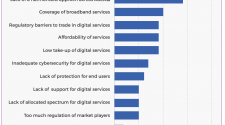DUBLIN–(BUSINESS WIRE)–The “Precision Medicine Market – Forecasts from 2021 to 2026” report has been added to ResearchAndMarkets.com’s offering.
The precision medicine market is evaluated at US$60.422 billion for the year 2020 growing at a CAGR of 8.79% reaching the market size of US$100.168 billion by the year 2026.
Increasing Chronic Diseases
The market is expected to be driven by the growth and surge in several chronic diseases such as cardiovascular diseases, obesity, and other related diseases. According to the World Health Organization, Cardiovascular diseases are one of the major causes of deaths, globally, every year. In 2016, an approx. 17.9 million people died from cardiovascular diseases, which represented approx. 31% of global deaths.
Most of these deaths were due to different types of strokes and heart attacks. Precision Medicines have been quickly moving towards real-world clinical features, and various scientific and research organizations, have been looking at different strategies to apply medicine to chronic disease management. Alzheimer’s and other related cognitive disorders are among some of the most frequent chronic diseases, which has been making a major impact on individuals, globally. According to the Alzheimer’s Association, approx. 5.8 million Americans, have been living with this chronic disease. And, according to the estimation, the number is projected to increase to approx. 14 million, by the year 2050.
There have been various developments in this market when it comes to cognitive disorders. In recent years, Scientists discovered at the University of Buffalo, that a human gene, which is present in 75% of the American population, is one of the major reasons why a section of Alzheimer’s Disease medicine or a drug, fails in human studies, despite showing promising results in animal studies. This is expected to be one of the factors in the growth of Precision Medicine, over conventional medicines. Diabetes is also one of the major reasons, which is expected to drive precision market growth. The National Institute of Diabetes and Digestive and Kidney Diseases, made precision medicines and drugs a major priority, for the institute’s Diabetes Genomics and Genetics Program. The program has aimed to identify the intergenic regions and genes that provide protection, against type 1 or 2 diabetes.
Companies Mentioned
- Thermo Fisher Scientific Inc.
- AstraZeneca plc
- F. Hoffmann-La Roche Ltd
- Pfizer Inc.
- Nordic Bioscience A/S
- Medtronic
- Novartis AG
- QIAGEN
- Quest Diagnostics Incorporated
- Bristol Myers Squibb
Current Trends
- In December 2020, Nucleai, a Tel-Aviv based startup, announced the development of a novel Artificial Intelligence software for image modeling and analysis of pathology data, which would be used in the development of more effective precision drugs. The company aims to become a major player in precision medicine in the coming years. The company had been using pathology data to discover biomarkers, a novel molecule in food, or tissues, to identify genome structure.
- In January 2021, Qatar Biobank, announced that 17,000 people participated in the banks’ genome program, which would be used in the development of precision medicines. The program was conducted to identify mutation carriers, by conducting various genetic analyses, which would be used to produce precision medicines in the coming years.
- In January 2021, 4basecare, a Precision Oncology startup, and Advanced Centre for Treatment, Research, and Education in Cancer, announced a collaboration agreement for an Artificial Intelligence-Driven Clinical Interpretation Platform, known as ClinOme. The program would be used In the generation of data insights to help oncologists with personalized options for treating cancer patients.
- In October 2020, Scientists from the University Of Glasgow announced the development of novel precision medicine for pancreatic cancer. The team used grown cells from the lab, and replicas of patients’ tumors, to find molecular markers, which were used in the prediction and response to several drugs, targeting DNA. The researchers raised an investment of 10 million pounds, which was used in the development and research of precision medicine.
- In October 2020, King Abdul Aziz University and the University of Oxford announced an agreement to develop a novel joint international innovations center for precision medicine and artificial intelligence. Under this agreement, the novel center would operate to bring together AI specialists to provide creative and innovative solutions for the development of precision medicines.
Key Topics Covered:
1. Introduction
2. Research Methodology
3. Executive Summary
4. Market Dynamics
4.1. Market Drivers
4.2. Market Restraints
4.3. Porters Five Forces Analysis
4.4. Industry Value Chain Analysis
5. Precision Medicine Market Analysis, By Technology
5.1. Introduction
5.2. Data Analytics
5.3. Bioinformatics
5.4. Gene Sequencing
5.5. Others
6. Precision Medicine Market Analysis, by Application
6.1. Introduction
6.2. Oncology
6.3. Central Nervous System
6.4. Immunology
6.5. Cardiovascular
6.6. Others
7. Precision Medicine Market Analysis, by Geography
7.1. Introduction
7.2. North America
7.3. South America
7.4. Europe
7.5. Middle East and Africa
7.6. Asia Pacific
8. Competitive Environment and Analysis
8.1. Major Players and Strategy Analysis
8.2. Emerging Players and Market Lucrativeness
8.3. Mergers, Acquisitions, Agreements, and Collaborations
8.4. Vendor Competitiveness Matrix
9. Company Profiles
For more information about this report visit https://www.researchandmarkets.com/r/6s6jjq
















